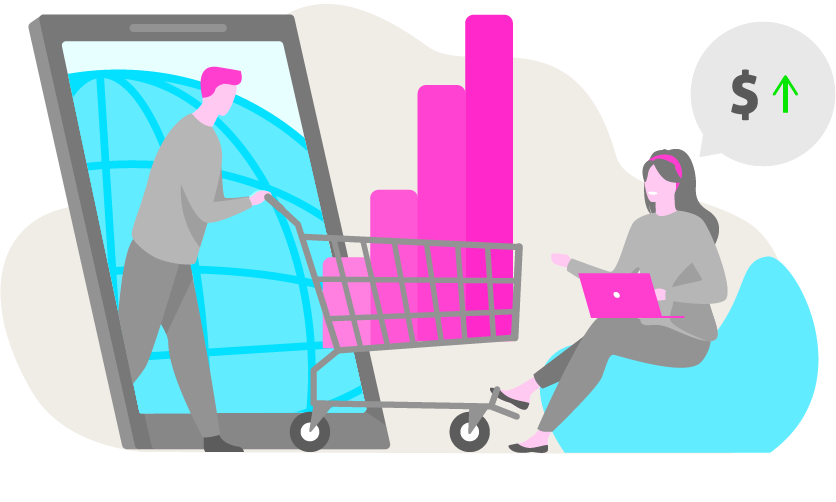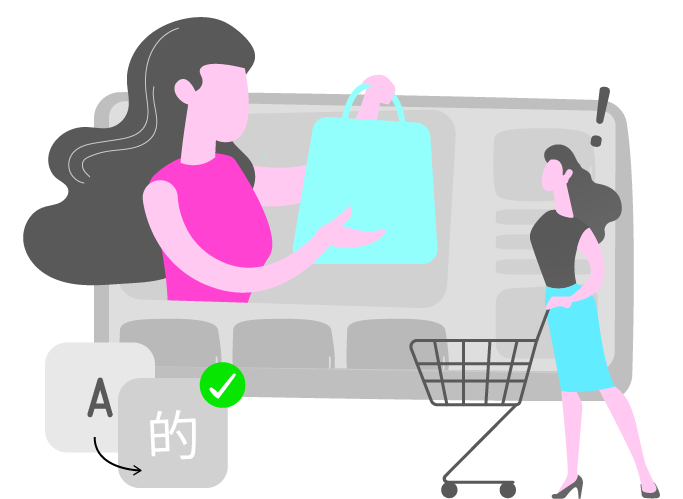If your business revolves around online trade, increasing sales inevitably means extending your reach to new audiences in foreign markets. To be successful, an e-commerce translation must: gain visibility, make your message understood, and generate trust.
When you launch an e-commerce project, you'll always have one major goal in mind: increasing sales. And when you want to grow, overcoming language barriers and reaching new markets, the true value of translating your e-commerce emerges, crystal clear.
In this article, we're looking at the three key factors set to turn your online goods/services business dreams into a reality. Specifically, we'll focus on the aspects directly linked to the translation of your online store. But let's start with a reminder of why you need to think (hard) about translating your e-commerce.
Translating your online store is a necessity
It's actually much simpler than it seems. It's not that translation will increase sales per se (which can also happen, but we'll get to that later), it's that if you don't translate your e-commerce website, you won't sellPeriod; first for people who don't understand you, and then for those who prefer to shop in their own language.
Back to the positive side. Becoming multilingual is an intrinsic element of approaching international markets (it's been the case since the Tower of Babel, it's just the way it is). And when you do it, you'll sell more; A LOT more people will hear about you, understand you, and put their trust in you.
Professional translations for more sales
For the stars to align and spark incredible results, three crucial elements come into an e-commerce translation: the right content, SEO and the technical functionality of the site. Three elements that the international translation and digital marketing experts tackle at all times.
We'll take a closer look at each of these elements, but the central concept to keep in mind is that internationalising your online shop is a task best left to the translation professionals. Which leads us to our first tip: if you want to increase sales, avoid automatic translations like the plague and put your trust in a decent translation agency.
Why is it so important to translate an e-commerce well?
Let's take one of the most obvious examples on one of the giants: a leading Chinese sales platform. A poor translation can send your cortisol and frustration levels soaring. Think about descriptions like this. OK, we hear you say; that's old (from 2018), and machine translation has come on a lot since then... Well, look at this automatic translator paradox (how many languages did you say?). It's equal parts reassuring and worrying to hear that "long-term use is not afraid of insufficient electricity" (direct translation from the Spanish).
OK, so that platform has taken off, and maybe you wish you had those kinds of problems? Of course; If you can offer those prices and get that volume of sales, we'll stop right there. But we imagine that's not the case. What we're trying to say is that if you translate your online store in line with high quality standards, it points you in the most efficient direction: having a positive impact on your audience, thus increasing sales.
Reaching your target audience with a translation
Because, joking aside, the real issue emerges when your customer finds the product they're looking for and wants it, but something 'doesn't fit'... maybe they don't understand the features or technical specifications. And promptly abandon their shopping cart - all because of a poor translation. And suddenly, it's not so funny anymore.

We all know that the aim of a translation is to make your message understandable in another language, but when it comes to sales and marketing, that just isn't enough; it's about attracting, persuading and convincing. The key lies in increasing your customers' confidence, and this largely depends on getting the translation right.
Benefits of translating your e-commerce
When we talk about getting a translation right, it goes beyond the text. Why? Because increasing online sales isn't (just) a matter of flowery prose and sensational copywriting. There are three clear benefits of specialist e-commerce translation that can be compared to three areas or tasks that fall under the remit of translation and international marketing.
Is your message understood? Increase your target audience!
More languages mean more customers. This rule of three is that simple, although there's certainly room for nuances, because you don't just want to reach more potential customers. It's ultimately about turning them into conversions and increasing your sales. In this instance, the translator's task is ensuring the quality of the translation.
What exactly does this mean? As we've mentioned before, carrying out a clear and faithful translation of the original text, free from linguistic errors, which is also culturally adapted to the target market. And, to top it off, the target text must be at least as attractive as the source text, if not more so.
Do they trust you? Improve the user experience!
Putting the 'basic' issue of understanding to one side, does having a translation of your e-commerce translate into trust among your customers? The user experience (UX) is the key factor here. And in terms of online sales, it's mainly driven by the user interface (UI).
Do you think the translator simply passes the baton to the developer? Well, you're right. But only half right. There are a number of language accessibility issues to tackle: issues such as text layout, colour choice, different currencies used, and the product labelling. Do you think developers are really going to concern themselves with the whole localisation process?
Have they heard of you? Improve your ranking with SEO!
Ultimately, if you're not visible, none of this makes much sense. This involves SEO, which (if you don't know already) is a set of techniques used to make your website (in this case your e-commerce or products) appear as high as possible on the rankings when someone searches for something online.
As it happens, this is also to a large extent the work of translators. They identify keywords, generate URLs, adapt the link building strategy and local SEO, translate structured data and tags, use geolocated tags and so on: a set of seemingly minor actions, which as a whole have a decisive impact on the efficacy of your e-commerce translation.
Do you want to conquer new markets with your e-commerce?
At ATLS, we'll take a professional, strategic approach to translating your online store and increasing your sales. What are you waiting for? If you want to expand your business, contact us!
Why should you work with a translation agency?
When it's time to get down to business and translate your online store, it's natural to wonder who to turn to. Because it means a lot to you. In this regard, translation agencies like ours add value in two respects:

- First of all, expertise: the sum total of academic training and professional experience. For example, our translators are familiar with different CMS and e-commerce plugins (like WordPress and WooCommerce).
- Secondly, it's about having the right technological tools to perform the task within a reasonable time frame - and at an affordable cost. We're talking about everything from licensed, proprietary software CAT tools to solutions for semi-automatic workflow management.
Three golden rules for increasing your e-commerce sales
What's the main thing you should focus on if you want your online store to have a 'shop window' in other languages (and a beautifully dressed one, at that)? Aside from the technicalities, it all boils down to the same thing: Gaining visibility, inspiring trust and transmitting a message. If you're looking for valuable tips, here are three:
- Your brand identity and value proposition needs to be clear. Translating content is all well and good, but if the content doesn't resonate there's not much you can do; think carefully about what you want to offer your customers, and what sets you apart from the competition.
- Strategically choose the languages you want to translate your e-commerce into, and the timings of your translations. This is critical. You can start with English and the main European languages (known as 'FIGS'), and only translate descriptions of your bestsellers.
- Maintain an open and fluid line of communication with your translation agency. Because above all, a well-managed workflow makes your life easier. But on top of that, you want the human touch; an approachable and personal service that satisfies your needs effectively.
Do you want to conquer new markets with your e-commerce? Write to us






